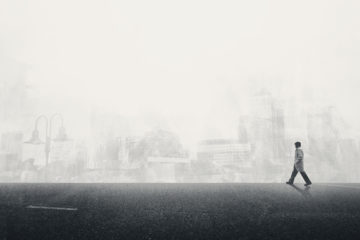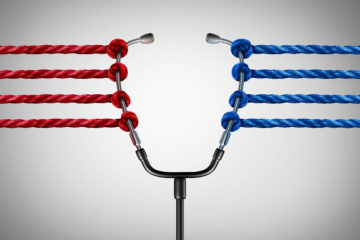The Health-Security Nexus: Reassessing Priorities after Covid-19
While Covid-19 has spurred debate about the need to elevate public health as a security concern, the securitisation of health presents both opportunities and trade-offs that need to be considered if we are to reallocate military spending to prepare for the next pandemic. The devastating toll of the Coronavirus pandemic has ignited a debate about the intersection of public health and national security. Once recognised as global leaders in pandemic preparedness, the United States and the United Kingdom have struggled to integrate policy responses to Covid-19 into existing security frameworks and to allocate resources accordingly. Indeed, public health spending in both countries pales in comparison to spending on counter-terrorism, even though more American lives have been lost to the pandemic than in all US wars since World War II and the number of Covid-19 deaths in the UK far exceed those attributed to terrorism in the last 50 years. Consequently, some academics and policymakers have questioned whether the prevailing notion of national security—a state’s capacity to defend its territory and …
“We might die of hunger before being killed by the virus”: How COVID-19 Compounds the Challenges of Pakistan’s Transgender Community
While the current lockdown in Pakistan has had a detrimental effect on livelihoods across the country, its impact on transgender communities has been particularly devastating. Covid-19 has revealed a troubling picture of transgender people’s social exclusion, marked by high poverty rates, a lack of social security programmes, and structural discrimination. Over the past years, there have been steps in the right direction towards recognizing Pakistan’s transgender community—most notably a 2009 Supreme Court judgement calling for the registration of transgender people as a ‘third gender’ and the Transgender Persons (Protection of Rights) Act, passed by Parliament in 2018. However, neither measure has been widely enforced. Pakistan needs transformative, equitable policies to ensure equal access to basic public services for its transgender communities, who are currently in a dire situation. Covid-19 provides …
Coronavirus and the Crisis of State Identity in Belarus
Even after achieving independence, Belarus is still known as the most ‘Russianised’ of the post-Soviet countries. Its unique retention of Soviet structures even after the breakdown of the USSR demonstrates the lack of cohesive state identity in the country. This has allowed Alexander Lukashenko, the country’s first and only president to date, to concentrate more and more power in his own hands. This article argues that Belarus’ crisis of state identity has enabled Lukashenko’s populist and, subsequently, authoritarian nature. Further, the lack of state identity has allowed him to neglect the severity of the Coronavirus pandemic. Belarus’s independence in the post-Cold War era was not a result of a long struggle, which hampered the formation of national identity. In 1991, …
Liberty in the Time of Corona
We are facing, not a simple trade-off between liberty and public health, but a more complex challenge to maintain liberty as non-domination, despite the erosion of liberty as non-interference. The coronavirus pandemic has led to the severe curtailment of civil liberties and the lockdown of billions of people worldwide. Some states’ reaction to the pandemic has been seen as more effective than others. In particular, authoritarian governments, such as China, boast about their efficient management of the crisis and are now providing support and advice to European and other nations. Consequently, many citizens are questioning the purported advantages of democratic governance. As both democratic and authoritarian states have imposed exceptional measures restricting political and civil liberties, there is a nagging …
Britain-China relations: Is Coronavirus a turning point?
The past five years have been deemed a “Golden Era” in Britain-China relations, with the two countries promoting bilateral trade and investments. However, as the Coronavirus pandemic marches on, this relationship seems to be souring. Voices in Britain, especially in Conservative environments, have raised need to rethink or reset the nation’s relationship with China, who is accused of misinforming and mismanaging the pandemic. While Coronavirus is exacerbating tensions, it would though be incorrect to blame it fully for the chill in relations. A distancing from China was already occurring prior to the pandemic. The foundations of the “Golden Era” were established during the Conservatives’ return to government in 2010. Chinese investments in the United Kingdom were seen as a key source …

Towards the Eruvian Age: Public Space in a Pandemic
In 2013, as two Fellows at New York University, we embarked on an “eruv tour” of Manhattan. Created through almost invisible strings attached to poles that envelope part of the city, this imaginary enclosure serves to delineate a religious space in which it is permissible to carry out the Jewish Sabbath. Today, we contemplate this almost invisible boundary running down Sixth Avenue with new appreciation of the insights it may yet bring to our current predicament as a pandemic of unprecedented proportions forces us to reinvent our common space, the boundaries which define it and the ways we can and should interact within it. The eruv was introduced in Roman Palestine around 50AD for a Jewish community where many of …

A campaign for the poor? The politics of Medicaid and the 2020 election
Since the 2018 midterm election, Democratic socialists have been leading voices in the Democratic Party, a trend that was all the more evidenced by Bernie Sanders’ resounding primary victories in states like Nevada, Colorado, and among others California. If anything, these voices have successfully brought poverty and social justice to the forefront of the Party’s politics as issues like child poverty, wages, housing and education dominated the primary debates. This was especially the case in Iowa on 14 January as protests by the Poor People’s Campaign took place outside the debate venue. The organisation represents the interests of the poor with a name referencing a series of demonstrations for economic justice organized in 1968 under the leadership of Martin Luther …
Covid-19: Will US World Power Continue On?
It has become a recurrent point for commentators to propose that we are living in the remnants of an old and dying world order with a new one waiting to take over. Namely, they predict that the US and the West is on the verge of losing its global hegemony to Asia. Even before Covid-19, many predicted that a Chinese-led world order was imminent, as evidenced by a photo in 2018 of US-China trade discussions. Philosopher Antonio Gramsci described such a period as an interregnum where “a great variety of morbid symptoms appear.” The divergent world responses to Covid-19 have been viewed as evidence of these symptoms. Commentators have continuously compared the inertness of Western governments with the efficiency of China, South …









